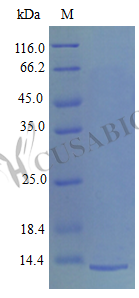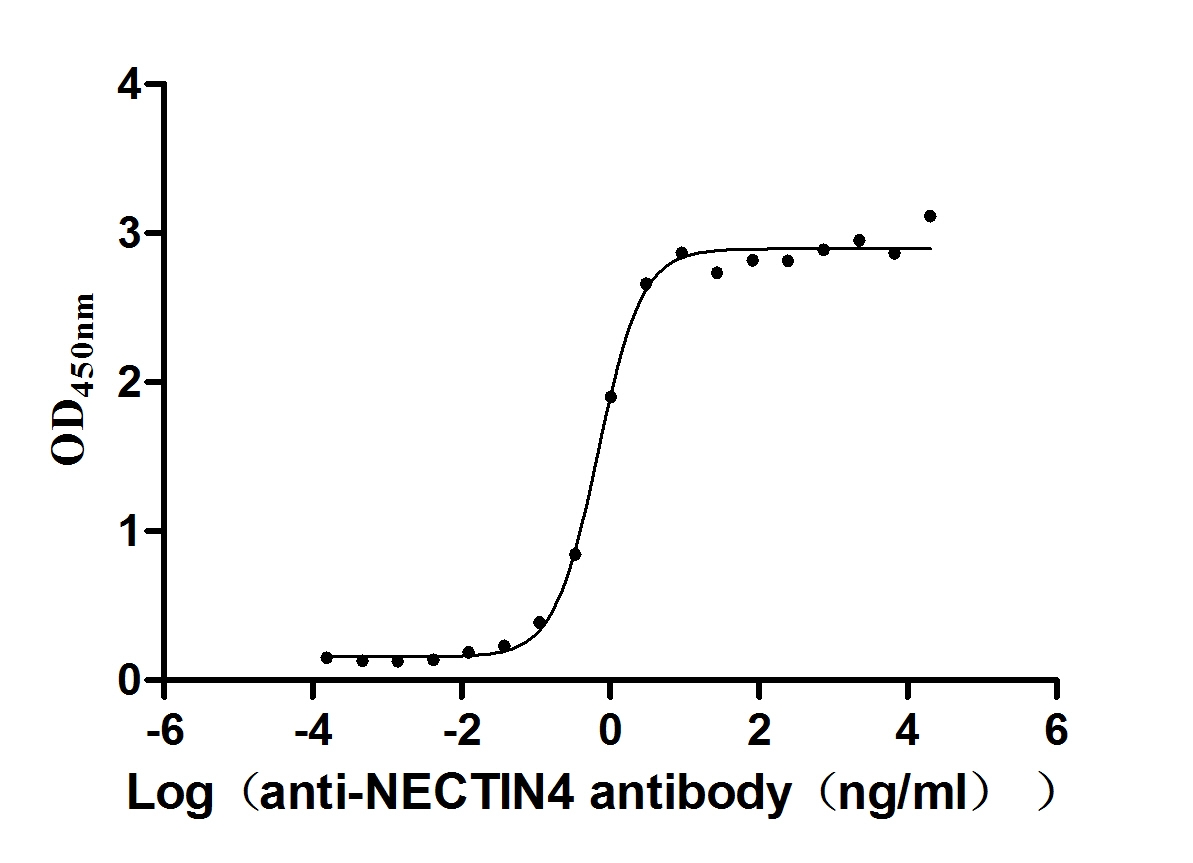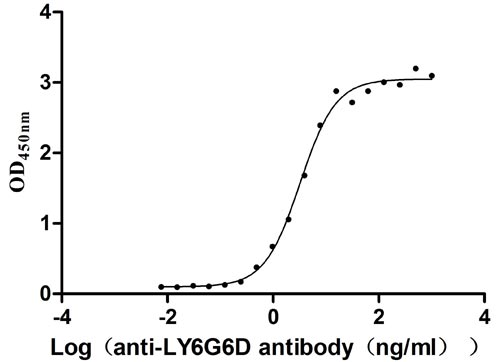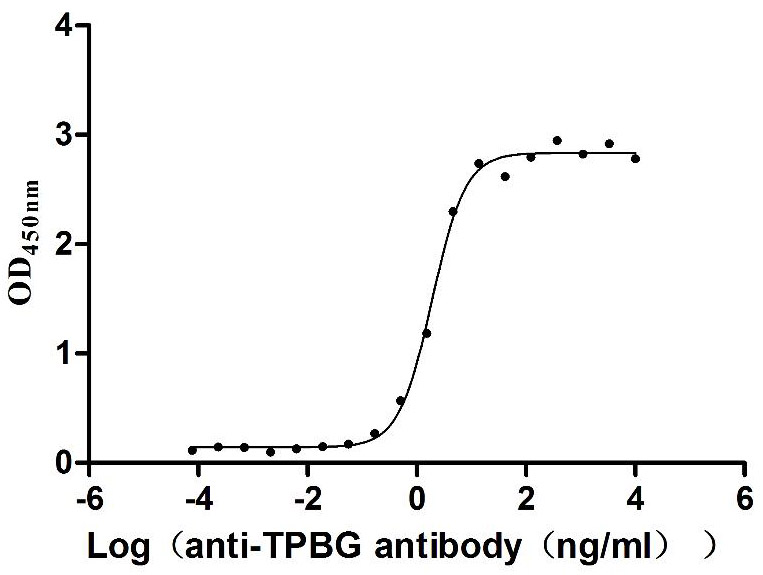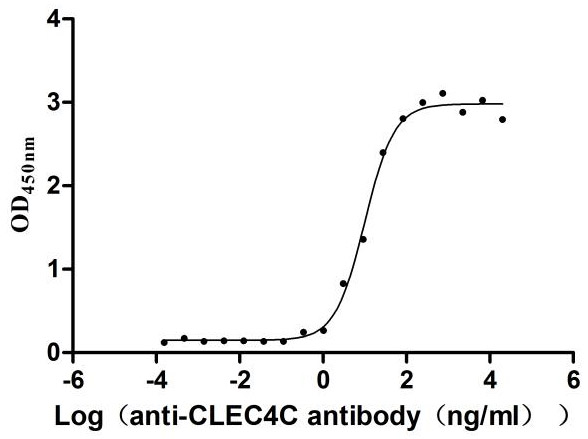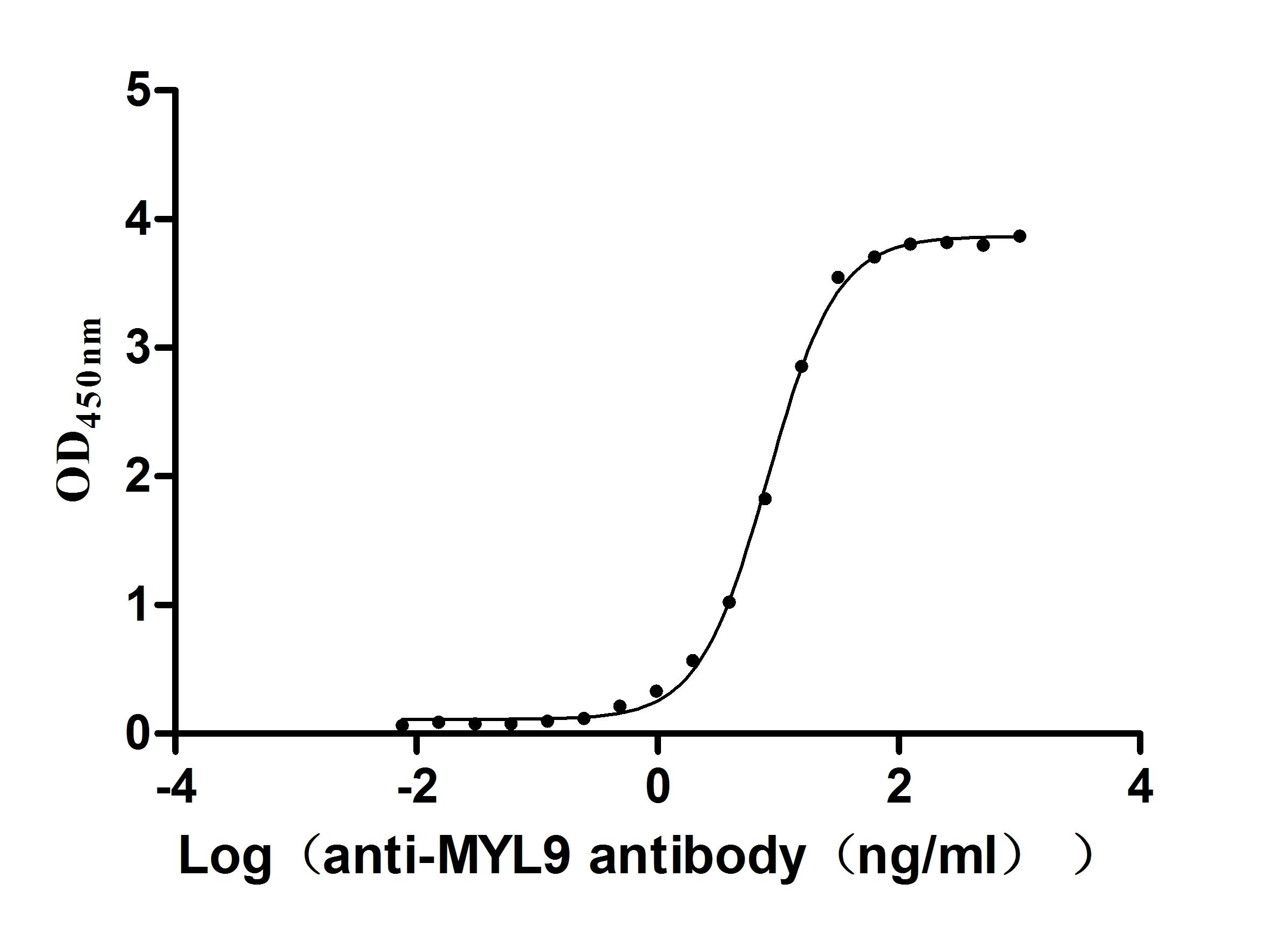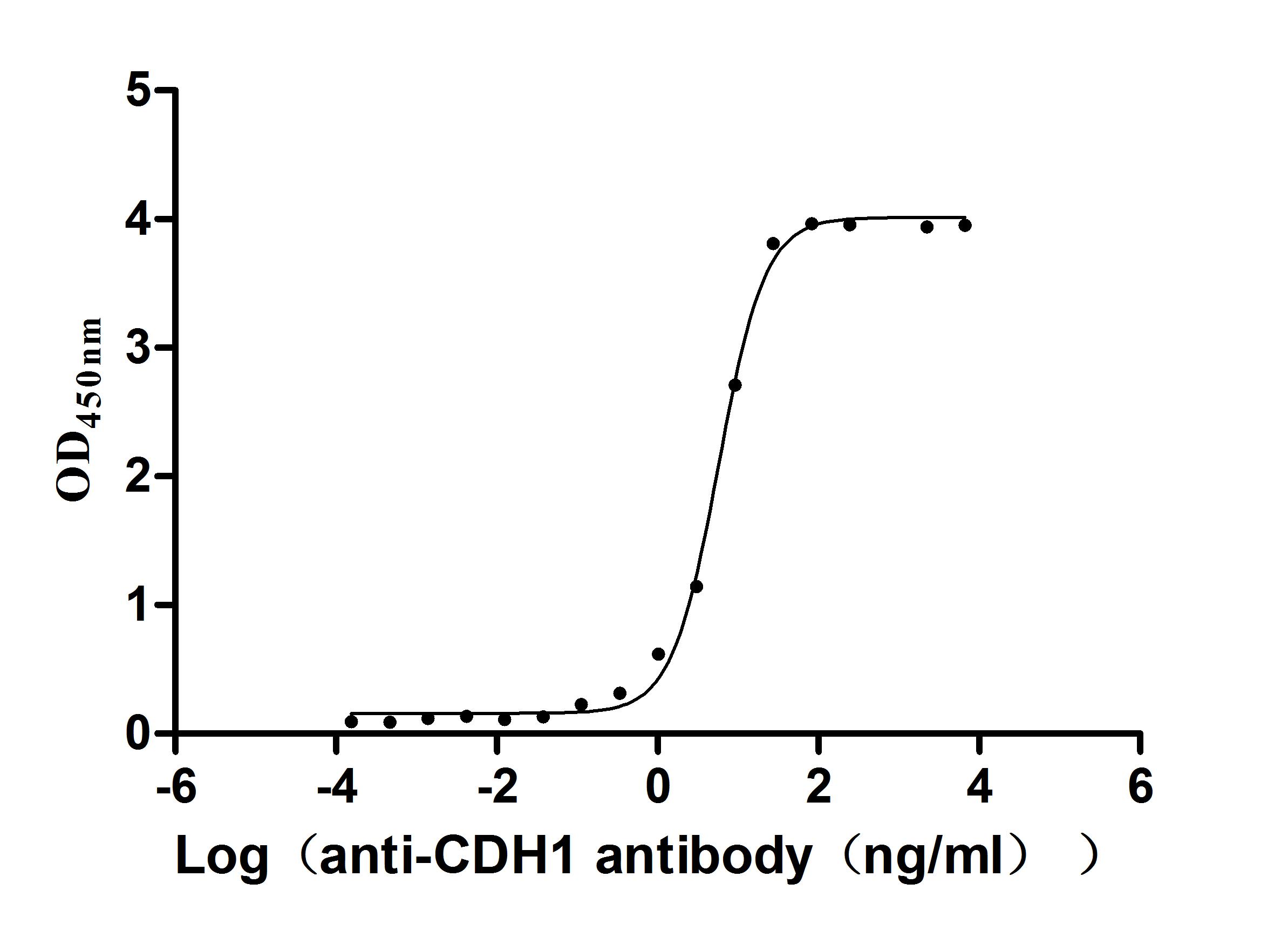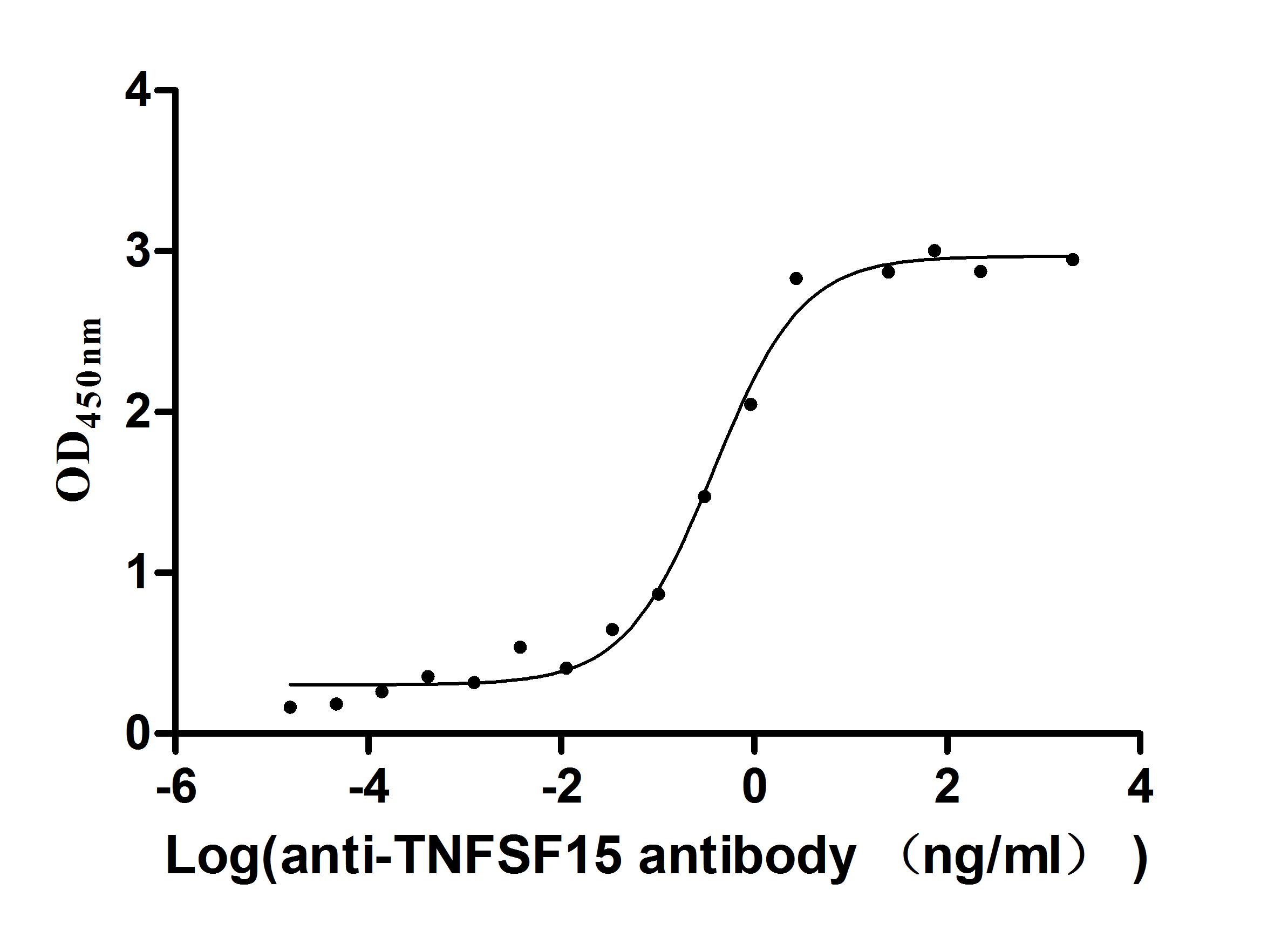产品详情
-
纯度:>97% as determined by SDS-PAGE.
-
内毒素:Less than 1.0 EU/μg as determined by LAL method.
-
生物活性:Fully biologically active when compared to standard. The biological activity determined by a chemotaxis bioassay using human neutrophils is in a concentration of 10-100ng/ml.
-
基因名:
-
Uniprot No.:
-
别名:Pf4; Cxcl4; Scyb4; Platelet factor 4; PF-4; C-X-C motif chemokine 4
-
种属:Mus musculus (Mouse)
-
蛋白长度:Full Length of Mature Protein
-
来源:E.Coli
-
分子量:8.2 kDa
-
表达区域:30-105aa
-
氨基酸序列VTSAGPEESD GDLSCVCVKT ISSGIHLKHI TSLEVIKAGR HCAVPQLIAT LKNGRKICLD RQAPLYKKVI KKILES
-
蛋白标签:Tag-Free
-
产品提供形式:Liquid or Lyophilized powder
Note: We will preferentially ship the format that we have in stock, however, if you have any special requirement for the format, please remark your requirement when placing the order, we will prepare according to your demand. -
缓冲液:Lyophilized from a 0.2 μm sterile filtered 20 mM PB, 1.5 M NaCl, pH 7.4.
-
储存条件:Store at -20°C/-80°C upon receipt, aliquoting is necessary for mutiple use. Avoid repeated freeze-thaw cycles.
-
保质期:The shelf life is related to many factors, storage state, buffer ingredients, storage temperature and the stability of the protein itself.
Generally, the shelf life of liquid form is 6 months at -20°C/-80°C. The shelf life of lyophilized form is 12 months at -20°C/-80°C. -
货期:5-10 business days
-
Datasheet & COA:Please contact us to get it.
引用文献
相关产品
靶点详情
-
功能:Released during platelet aggregation. Neutralizes the anticoagulant effect of heparin because it binds more strongly to heparin than to the chondroitin-4-sulfate chains of the carrier molecule. Chemotactic for neutrophils and monocytes. Inhibits endothelial cell proliferation.
-
基因功能参考文献:
- these data demonstrate that PF4 has an important role in increasing B cell differentiation in the bone marrow environment PMID: 28914425
- these results identify CXCL4 as a vital immunoregulatory chemokine essential for protecting mice against influenza A virus infection, especially as it affects the development of lung injury and neutrophil mobilization to the inflamed lung PMID: 28120850
- These results indicate that CXCL4 is a novel Ni-binding protein that augments Ni allergy at the elicitation and sensitization phases. This is the first study to demonstrate that the Ni-binding protein augments Ni allergy in vivo. PMID: 28319310
- PF4 was produced by Ly6G+CD11b+ immature myeloid cells in the early stage premetastatic lungs, and decreased during metastatic progression. PMID: 27223426
- These data demonstrate that the CXCR2 network and CXCL4 play a role in the maintenance of normal HSC/HPC cell fates, including survival and self-renewal. PMID: 27222476
- Platelet-derived CXCL7 and CXCL4 contribute to the pathogenesis of acute lung injury. PMID: 27755915
- CXCL4 plays an important role in pancreatic inflammation PMID: 27183218
- Platelet secretion of CXCL4 is Rac1-dependent and regulates neutrophil infiltration and tissue damage in septic lung damage PMID: 26478565
- PF4 has a complex intramedullary life cycle with important implications in megakaryopoiesis and hematopoietic stem cell replication not seen with other tested alpha granule proteins. PMID: 26256688
- Heparin enhances antigen uptake and activation of the initial steps in the cellular immune response to PF4-containing complexes. PMID: 25960020
- Data indicate that platelet factor 4 (PF4) is involved directly in liver innate immune response against ischaemia-reperfusion injury (IRI) by regulating Th17 cell differentiation. PMID: 25440775
- CXCL4 regulates hematopoietic stem cell cell cycle activity. PMID: 25326802
- Platelet factor 4 has a role in regulating Th17 differentiation and cardiac allograft rejection PMID: 24463452
- Histones regulate activated protein C formation in a manner similar to PF4 and suggest heparinoids may be benificial in sepsis. PMID: 24177324
- PF4 drives a vascular smooth muscle inflammatory phenotype including a decline in differentiation markers, increased cytokine production, and cell proliferation. PMID: 23568488
- PF4 expression on intestinal epithelial cells is increased after IR at both the mRNA and protein levels. In conclusion, these findings demonstrate that may PF4 represent an important mediator of local and remote tissue damage. PMID: 22792197
- These results suggest that Cxcl4 and Cxcl7 play a role in the development of neurobehavioral alterations that are triggered by in utero TCDD exposure and later surface in adults. PMID: 21509788
- PF4 may have a role in bacterial defense, and heparin-induced thrombocytopenia is probably a misdirected antibacterial host defense mechanism. PMID: 20959601
- In vivo, half-life and diffusibility of CXCL4L1 compared with Cxcl4 is strongly increased. PMID: 20688960
- These data indicate that PF4 induction of monocyte KLF4 expression may be an important step in the pathogenesis of experimental cerebral malaria. PMID: 20454664
- Micronutrients effectively promote tumor dormancy in early prostate cancer by inducing platelet factor-4 expression and concentrating it at the tumor endothelium through enhanced platelet binding. PMID: 20525356
- CXC chemokine ligand 4 (Cxcl4) is a platelet-derived mediator of experimental liver fibrosis. PMID: 20162727
- important role for PF4 in thrombosis and neutralization of PF4 is an important component of heparin's anticoagulant effect. PMID: 14764524
- Platelet factor 4 and interleukin-8 CXC chemokine heterodimer formation modulates function at the quaternary structural level PMID: 15531763
- the PF4 storage pathway in alpha-granules is not a default pathway, but rather a regular granule storage pathway probably requiring specific sorting mechanisms PMID: 15613031
- analysis of granule targeting sequence within platelet factor 4 PMID: 15964840
- clinical heterogeneity in the HIT immune response may be due in part to requirements for specific biophysical parameters of the PF4/heparin complexes that occur in settings of intense platelet activation and PF4 release PMID: 17848616
- platelet-associated PF-4, but not its plasma counterpart, may represent a potential biomarker of early tumor presence PMID: 17914028
- platelet specific chemokine PF4 promotes atherosclerotic lesion development in vivo PMID: 18000617
- Brain microglia are a cellular source of CXCL4 gene expression. PMID: 18248618
- platelet-derived PF4 contributes to immune activation and T cell trafficking as part of the pathogenesis of experimental cerebral malaria . PMID: 18692777
- Platelet factor 4 regulates megakaryopoiesis through low-density lipoprotein receptor-related protein 1 (LRP1) on megakaryocytes. PMID: 19605848
显示更多
收起更多
-
亚细胞定位:Secreted.
-
蛋白家族:Intercrine alpha (chemokine CxC) family
-
数据库链接:
KEGG: mmu:56744
STRING: 10090.ENSMUSP00000031320
UniGene: Mm.332490
Most popular with customers
-
Recombinant Human Nectin-4 (NECTIN4), partial (Active)
Express system: Mammalian cell
Species: Homo sapiens (Human)
-
Recombinant Human Lymphocyte antigen 6 complex locus protein G6d (LY6G6D) (Active)
Express system: Yeast
Species: Homo sapiens (Human)
-
Recombinant Macaca fascicularis Trophoblast glycoprotein (TPBG), partial (Active)
Express system: Mammalian cell
Species: Macaca fascicularis (Crab-eating macaque) (Cynomolgus monkey)
-
Recombinant Human C-type lectin domain family 4 member C (CLEC4C), partial (Active)
Express system: Mammalian cell
Species: Homo sapiens (Human)
-
Recombinant Human Myosin regulatory light chain 12B(MYL12B) (Active)
Express system: E.coli
Species: Homo sapiens (Human)
-
Recombinant Human Cadherin-1(CDH1),partial (Active)
Express system: Mammalian cell
Species: Homo sapiens (Human)
-
Express system: Mammalian cell
Species: Homo sapiens (Human)
-
Recombinant DT3C (Diphtheria toxin & spg 3C domain) for Antibody Internalization Assay (Active)
Express system: E.coli
Species: N/A

